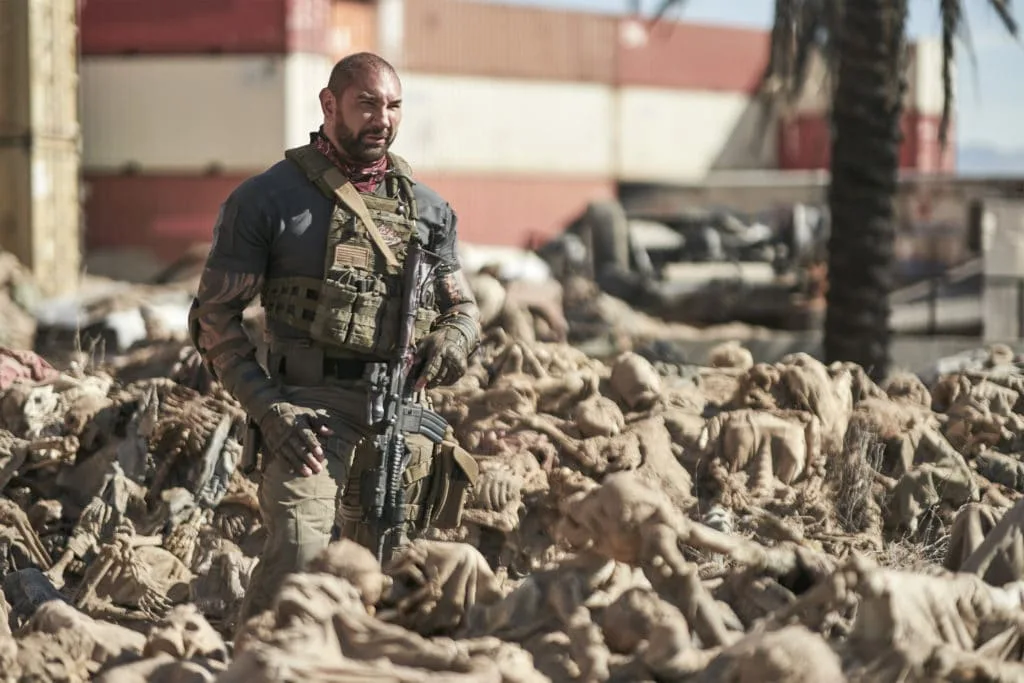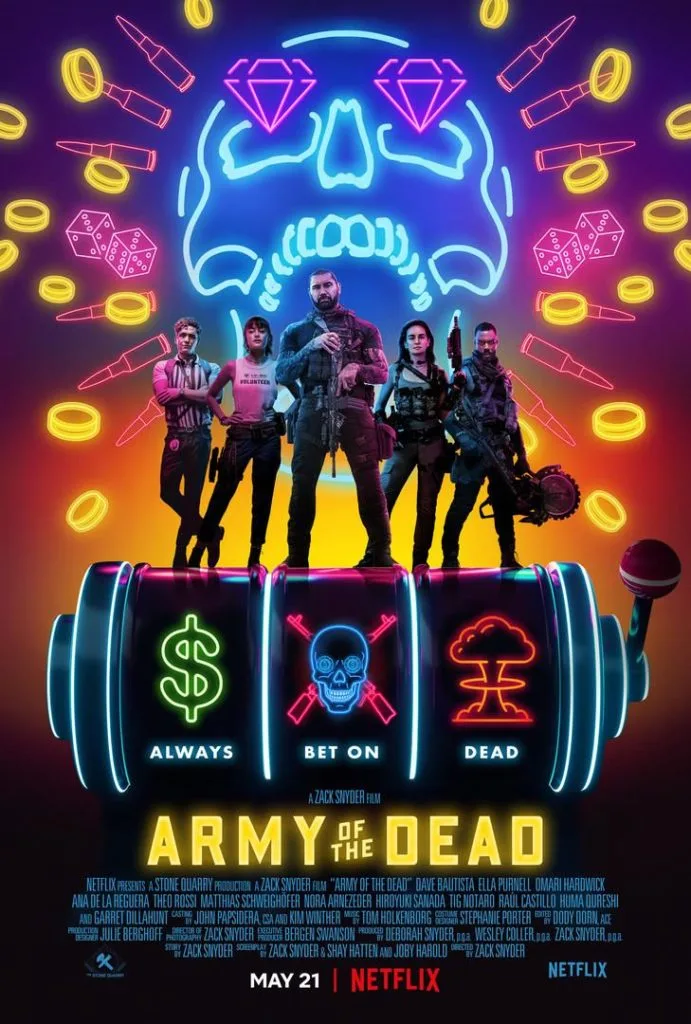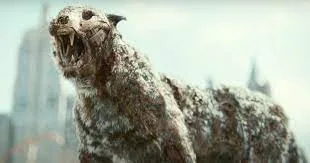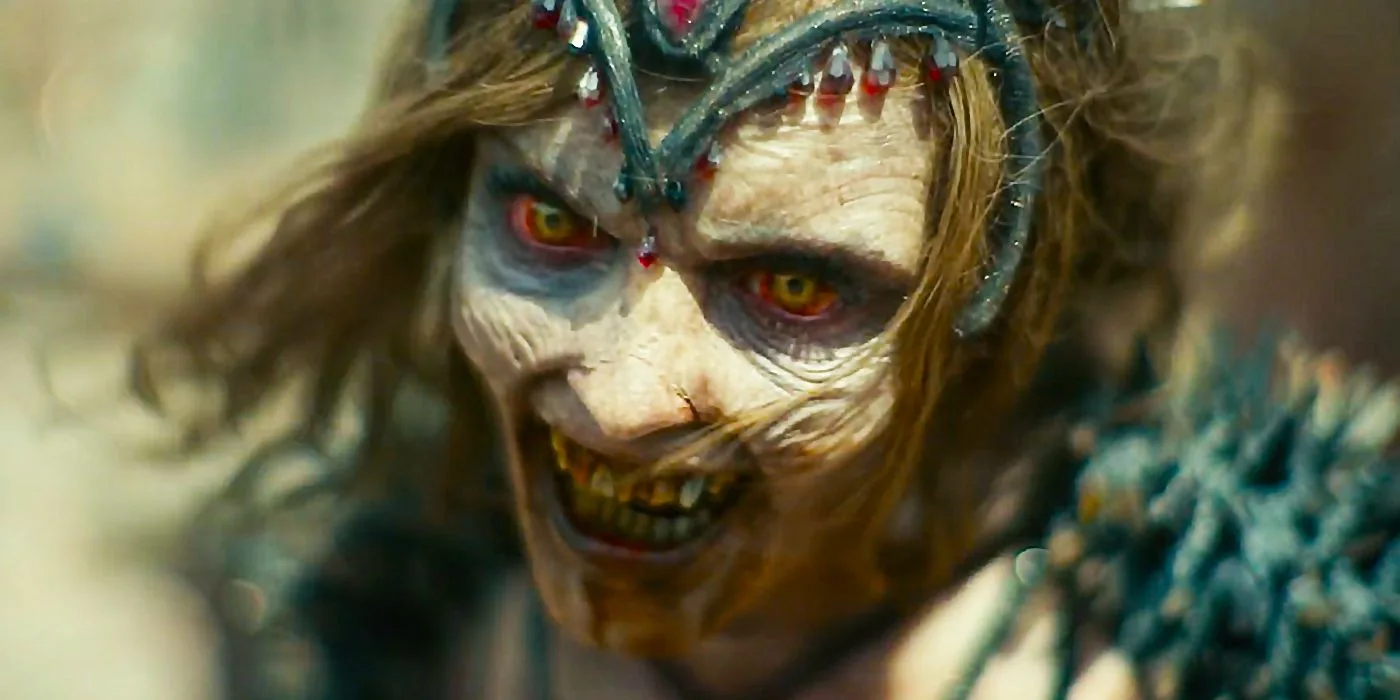
This is an opinion article about Army of the Dead which contains spoilers.
Here in the UK, we’ve been under a pretty protracted Covid lockdown which is only just coming to an end. Somehow, I managed to get to a film festival last October, narrowly missing the all-out lockdown which was to follow, whilst having to navigate what turns out to have been a pretty ineffective ‘tier’ system, but I’m not knocking it: I’m glad I got to go. Still, last October feels like a long time ago, so I was really looking forward to getting out to a cinema again. Excitedly, last week I checked the listings for what was to come.
The results were not great. Whilst one of the smaller local cinemas was showing the new Saw-adjacent film, everything else was misery, misery, misery – and not fantasy misery, but real, recognisable, worldly misery. Having just lived through a third lockdown, I was really rather looking forward to some escapism, not a ‘thought-provoking’ or ‘hard-hitting’ array of socially-conscious dramas. Most of 2021 so far had been a thought-provoking, hard-hitting socially-conscious drama. I wanted escapism. Step forward, then, Zack Snyder, with Army of the Dead, a film which hasn’t just turned out to have fortuitous timing (though more by luck than design) but has neatly filled the void in the listings which was crying out for something bloody silly. From a personal perspective, it did not disappoint.
I’ll be the first to admit, I haven’t seen any of Snyder’s superhero films – turns out I’m very fussy about my escapism – but his directorial debut, the at-the-time contentious Dawn of the Dead remake (2004), has steadily gone from low to very high in my estimations. At the time, I think I was outraged that it had dared to reimagine anything from the hitherto-untouchable Romero oeuvre, and disappointed too that it had gone its own way; with a more mature eye, I’m glad it did things exactly as it did, and it’s by far and away one of the best remakes of the sudden glut of these which emerged. I could be facetious here and say that it does a few things better than the Romero original even, a classic horror film where the faults are often casually overlooked in favour of the good by fans with an almost religious devotion to their old favourites, but as I’m myself about to casually overlook some of Army of the Dead’s faults in favour of the good, I’ll leave that thought here for now. The fact is, I had a reasonable amount of confidence in Snyder to give us an at least entertaining zombie flick, and Army of the Dead fitted the bill admirably, even whilst moving away from the undeniably grisly, and largely straightforward spin on the zombie motif which Dawn of the Dead ’04 brought to our screens. Is it a perfect film? Absolutely not. Is the ire from some quarters nonetheless baffling and tedious? Absolutely. In the interests of fairness, here follows a little break-down of the good, the bad and the ugly of the film, but for sure, my overarching feelings are very positive. This was exactly what we all needed right now.
The Genre-Mashing Elvis Excuse
For someone who has never been to Las Vegas, but incorrectly feels that they know a lot about the city through cinema, the Las Vegas setting was a real plus via its potential for a dash of a trashy, performative, excessive backdrop. As a city with a reputation for glamour, excess, gambling, ill-advised wedding licenses and a level of artifice which has become legendary – there’s a pyramid on the main strip, for god’s sakes – of course it was going to provide a good setting for a zombie outbreak. But wait…there is quite a lot to unpack regarding the initial outbreak, a military operation which starts out talking about UFOs and Area 51 before the inevitable newlyweds/poor observance of driving safety/firebomb which results in the release of the…alien zombie world builder? This isn’t made terribly clear in the film, one of a few moments where I felt that either things were being lined up for a sequel or underwritten simply to get us to the spectacle, but regardless, Vegas is where shit starts to go down, with a lovely long shot from the desert down over the bright lights.
Soon overrun by bitey showgirls and, thank you Lord, a zombie Elvis impersonator (I’ve finally seen one up close), Vegas is turned into a walled city to keep the undead hordes inside. The powers-that-be decide that only a nuke can straighten out the situation, though the city looks like it’s already been hit by one (someone played Fallout New Vegas and enjoyed it, I reckon). Before this happens, like, right before this happens, hence disrupting the stereotype of Japanese people as being punctilious and prepared, a mysterious Japanese businessman sets the wheels in motion to gather a crack team of military personnel (and a safecracker) to go into Las Vegas to retrieve a lot of money from a hotel safe. This crack team consists of some people who worked together to secure the Vegas borders when all of this first happened: Scott Ward (Dave Bautista) joins up with a group of fellow soldiers, crooks and ne-er-do-wells to go in and fulfil this absurd request, because they get the option of a share of the cash. No, it doesn’t make a lot of sense, frankly, but a side quest involving Ward’s estranged daughter blends a dash of military muscle and a bit of human interest, though rest assured, there is no dense layer of social commentary here. You’d have to look very hard for it, and you’d still come up short. Perfect.
King and Queen of the Zombies?
I’m not entirely sure why Snyder decided that a horde of rhinestone zombies wasn’t enough on its own; there are definitely layers to the mythos here which weren’t needed or included in Dawn of the Dead ’04, and again, there feels like more to come, either in the new pre-production TV series or in subsequent films. It’s a funny thing, because some of the most successful and watchable zombie films of recent years – Train to Busan, say – were completely unambitious in terms of what the zombies actually did, prioritising human relationships threatened by the sudden shift in events towards a sudden array of mindless, violent ex-people. Army of the Dead has our Patient Zero Alien Zombie guy acting de facto as King of Las Vegas, and he’s taken a queen – presumably from a cosplay gathering of some kind, to look at her. To gain access to Vegas, it’s necessary to deposit an offering to the royal couple, this being a living human being which they then stash somewhere and turn into ‘one of them’ in due course. Come to think of it, there’s a surprising lack of traditional biting/tearing for large amounts of time here given the sheer numbers of zombies you would expect from an early crowd scene, but the selected emphasis on a hierarchy takes away a little from this approach, and drags in something else – similarities to a few vampire movies, as well as nods to other films.

I noticed a few of these, in just the same way you can easily spot a few references to the likes of Aliens in the appearance and behaviour of the crack squad on the trail of the cash. Stake Land 2: the Stakelander (2016) dispensed with the straight-up vampire mythos of the first film and installed a ‘Vampire Queen’ who retains a sense of intelligence and purpose in contrast to those who serve her; the I Am Legend remake in 2007 not only resembled Army of the Dead in its ruined city streets (and big cats at liberty to roam around) but also featured the idea of the ‘hive’, where the infected congregated and communicated with one another, working to a kind of hierarchy with at least one thinker able to understand and plot against Neville (Will Smith). If this isn’t borrowing, it’s a hell of a coincidence, and it could all have proved too much, if the film hadn’t merrily traipsed through all of this with not a great deal of consideration, lining up new elements simply to play them through for a bit of suspense or a wry laugh. Leaving aside the team’s decision that heading into a hotel was the best possible option, even though I’m not sure that was the right hotel or in any way, shape or form the best possible option, the presence of an array of seemingly napping zombies inside was an immediate shoe-in for a fun sequence of sneaking, inevitable failure and bloodshed. The King and Queen motif is probably completely unnecessary, but how else are you going to get a zombie walking around in a helmet and a cloak? Or plunging his hand into the dead-again belly of his queen consort to retrieve a glistening, mewling zombie foetus, a kind of horror riff on the Pilsbury Doughboy? Admittedly Snyder has form with zombie babies, but this was a glorious, head-scratching moment, and one among many too.
The Cunning Plan
Of course, it’s churlish to poke holes in the zombie elements of the plot without turning our attention to the plot proper – the heist element, this idea to sneak into a zombie-infested hellhole (and as it turns out, monarchical society), load up on bags and bags of hard cash, which itself easily looks as alien now as any reanimate corpse, and then fly to safety, using a helicopter which, even if it was pristine when it was left on that roof, has seen better days by now. I mentioned the family-orientated secondary plot; there is of course a Company Guy with ulterior motives who accompanies the squad into Vegas, and you’ll never guess what he wants to do? Yes, smuggle a zombie out, or even smuggle a bit of one out: they’d make great assets in warfare, see. I told you there were resemblances to Aliens, right down to a particular bandana. And, as in Aliens, I get the impression that the great and the good haven’t really thought this one through: xenomorphs, zombies, all decidedly uncooperative.
But even if the culmination of that plan made good, solid sense, the guy they send in to make it happen confuses very, very easily and ends up falling for the old swaperoo, taking the wrong bag and not in fact collecting a zombie head. Ultimately, this turns out not to matter all that much as the entire crew eventually get bitten, shot, pulled to bits, or …locked in a safe? Easily done. Again, the tone throughout all of this going down is never completely serious; if you start to get too immersed in the peril of any given situation, you will readily be assigned a massive, probably inexplicable explosion or a minor plot shift which picks up a different part of the story; we’re rarely allowed to linger, and it’s only right at the end when it turns out that absolutely everything has been for nothing that we get a slowed-down sequence where people pause to really talk to one another.
But even so, and I do feel that Bautista does a great job here with what he’s given, a large chunk of the film is an inevitable follow-up to Ward’s warning to his daughter Kate to tell her that she has to stay within his sight at all times. She goes off to find some hapless friend of hers who has been snuck in to try and partake of the rich pickings left in the city; the thing is, Geeta, i.e. the whole point for the story arc where Kate disobeys her dad and minces off on her own to try to rescue her, seems to disappear mysteriously from the plot upon retrieval. I may have been missing something in the midst of yet another explosion, but where on earth does she go? Everyone is dead, dying or injured through looking for her, but she doesn’t seem to even be in the wreckage at the end. If she turns up as another Zombie Queen somehow, I called it first.
‘Where you stumble, there lies your treasure.’
Oh well, oh well. I enjoyed the blend of the brutal, the pessimistic, the utterly pointless and the borderline laugh-out-loud moments of the ending; I’ve seen criticism of the film elsewhere saying that it’s not genuinely funny, but I really think it is; the sheer OTT nature of the series of unfortunate events which sweep our usually amiable, but thinly-drawn characters along provides for a fair few humorous lines of dialogue, and like a game of toy soldiers, it feels like we could simply go again with a few other soldiers in a new setting – Mexico, wasn’t it? They even threw a nuclear missile in there. I just don’t know what some people want, and don’t give me all that stuff about ‘a better film’, ‘a more coherent plot’. There is a time and a place for a coherent plot, but even if we ignore the many superb zombie films which have taken the starting point of an outbreak to explore very human concerns and dilemmas, slamming a zombie film for being nonsensical seems an odd choice of critique. Look at the justifications we’ve had for the dead starting to walk…a space probe…a farming tool…viruses which turn people into ravening gymnasts…see, zombie cinema is a kind of monster cinema, a grisly fantasy where we either play out our terrors of death, or take these as read and head in a different direction, having fun with the sheer excess and panic and silliness. I seem to remember a certain revered zombie classic spending a few minutes hitting the undead with custard pies. Plop that scene into Army of the Dead, where to be fair, it would fit fairly well tonally, and people would be outraged at its lack of respect for the genre and the fans.

The only really unforgivable thing for me is where zombies are added in to a film out of a complete dearth of imagination, and the need to have one’s cost-effective daft friends stumbling around in once-white clothing. Army of the Dead may be many things, and in common with so many films of today its runtime is way too long, but in its high-action sequences it certainly doesn’t lack imagination. If anything, it shoehorns so much in there that it’s easy to lose track of what the hell is going on. But, to reiterate, it is exactly the kind of escapism I was after. Against a backdrop of banal, brow-beating or quaint current cinema offerings, it’s easy to see how and why Netflix is so often able to run rings around the cinema, and I sincerely hope that Army of the Dead’s overall success gives a clue to filmmakers and cinemas about the range which audiences want to see. Less than two hours, please, but let’s have a bit of spectacle which doesn’t make us feel anything except entertained; bravo to Army of the Dead for delivering the spectacle. Did I mention the zombie tiger?
